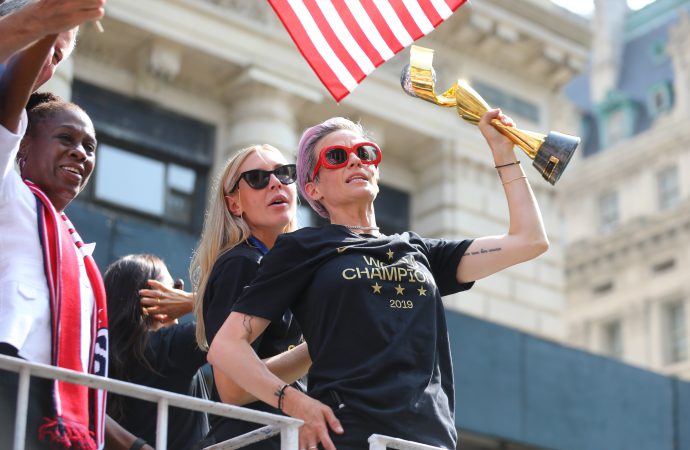A new form of capitalism is emerging that places purpose above profits. Sport needs to get with the programme, says Neill Duffy
Bob Dylan’s lyrics are as applicable now as they were when he first wrote them in 1964, albeit for different reasons.
The changes in 2020 – the ones that sport executives should be most interested in – are being fueled by the move to purpose that has been underway societally since the global collapse of the world’s financial markets in 2008. They are underpinned by a growing expectation from people (consumers/fans/citizens), particularly among the young, that organisations stand for something more than just profits
These same consumers are prepared, like at no other time in history, to hold organisations and people accountable for bad behavior. Exhibit 1: Greta Thunberg.
As a consequence, the continued relevance of the Milton Friedman fueled “shareholder first” model that has dominated business schools and the management philosophy in business for the last five decades is now being questioned. People today are calling for a new “stakeholder first” approach from business where the interests of all stakeholders – including the planet and all its inhabitants – are held paramount as opposed to just the interests of the shareholders of a business. This is changing the way that business is done. A new form of capitalism is emerging.
Recent seismic announcements from the bastions of capitalism – the likes of The Business Roundtable, the World Economic Forum and BlackRock (the world’s largest fund manager with more than $6trillion under management) – have formally ushered in the arrival of the ‘Purpose Economy’. Business is saying: “Purpose is alive and kicking, it matters to our customers, and it therefore matters to us. It’s time for us to start doing good while doing well”. It’s a message that I and other fellow “do good while doing wellers” have been preaching for years so you can imagine how pleased we are.
Progressive
While the business sector has in recent years rapidly embraced this move to purpose, the reality is that the business of sport has generally been slow on the uptake fueled in no small part by the inertia in the sports ecosystem powered by the huge amounts of money from broadcasters and sponsors that have continued to support the status quo. Jerry McGuire is not a fictional character – “show me the money” is the generally accepted mantra across sport.
But times they are a-changin’ in sport too as the more progressive and open thinkers within the sector (under increasing pressure from fans, sponsors and athletes) are starting to get with the programme. They recognise that purpose is perhaps one of the most exciting opportunities to come sport’s way in many years, while also recognising that it poses one of the industry’s greatest risks.
Inspired by pockets of purposeful activity in sport over the last decade, the mainstream onboarding of purpose by sport has finally got underway – following exactly the same trajectory as business did over the last 10-15 years – starting with purpose at a functional operational level within organisations and a focus on things like waste and carbon reductions and offsets.
The UNFCCC Sports for Climate Action Framework that came into being at the back end of 2018 is a huge and commended step in the right direction for sport even though – health warning – it is easier to sign on to something like this than to execute it.
But purpose is about more than just operational considerations and efficiencies. It provides a myriad number of business benefits to savvy leaders, including competitive advantage, a lens through which to remain relevant to and engage with young audiences, and a source of new revenue streams.
Centre of the debate
Global Sports Week, the new show on the conference circuit and most exciting thing to happen in this space for a while now, is placing purpose at the centre of the debate – a debate that will include some of the sport industry’s leading executives in Paris this February.
Successful recent pro-social initiatives from athletes like Megan Rapinoe, Colin Kaepernick, Serena Williams and Juan Mata; brands like P&G, Nike, adidas and AXA; and properties like the IOC, Danone Nations Cup, Paris 2024, LA 2028, Rugby World Cup 2023, Formula E, The Ocean Race and Super Bowl 50 have all given sport permission to embrace the age of social good. Even Formula 1, under the new progressive management of Liberty Holdings, has announced a bold new sustainability commitment.
So, with all of this as a backdrop, what advice are we sharing with our clients at the start of 2020:
1. The sport sector’s increasing adoption of purpose presents an exciting activation opportunity for brands through their investment in sport. As a consequence, we will see more brands activating purposefully in the next decade.
2. Progressive thinkers should be looking for opportunities to build purpose coalitions that include multiple sport stakeholders including sponsors, athletes, sport-based non-profits and sport properties recognising that we can get more done together than we can alone. As a consequence, nonprofits operating in sport will have an increasingly influential role to play in sport and will start engaging in sport more boldly recognising the value they have to add.
3. Fans are actively looking for ways to be engaged in doing good for and alongside their favorite sports teams, leagues and athletes. Those that involve fans directly in doing good will build deeper engagement with their fans and appeal to younger audiences.
4. It’s time for sport properties, athletes and brands to move beyond simply doing less bad to actively looking for ways to do more good through sport. Sport is, in our opinion, one of the most powerful platforms available to lead the transition to a sustainable future. This is particularly relevant for properties looking to build deeper relationships with their key stakeholders through purpose.
5. Properties and athletes should be looking for ways to monetise their commitment to act more purposefully and, in the process, integrate purpose as a key commercial driver within their organisations – new business models, new partners, new revenue streams, improved efficiencies and reduced costs.
One-offs don’t work
And, how is our advice this year different from the advice we have given in prior years?
1. Authenticity has always been important. In 2020 it’s doubly important, as is a long term commitment to deliver real lasting social and/or environmental impact as a legacy. One-offs don’t work anymore. You need to play the long game. The fans will hold you accountable for what you say and don’t do like never before. Ask Roger. #WakeUpRoger
2. Budgets need to be allocated to impact measurement and evaluation to track the difference being made in the world on an ongoing basis. Science-based approaches to measurement are now necessary to pass the public’s smell test.
3. Amplification of a brand’s alignment with the Sustainable Development Goals through sport presents an interesting opportunity as the Goals move into the mainstream consciousness. The next decade will be the decade of The Goals.
4. Brands should include purpose deliverables as part of the obligations of the properties and athletes that they sponsor and make delivery contractual. Purpose deliverables are no longer nice to have, they are mandatory in any rights package.
And what do we see as the biggest challenges or risks or purpose in 2020?
1. Purpose still being treated as a form of CSR as opposed to a management philosophy or strategic organising principle resulting in underperforming programs that question the validity of purpose as a management philosophy.
2, Purpose-washing and dilution of trust amongst fans as a result of purpose commitments being made and not being kept.
3. Shortage of skilled and experienced expertise that understand the world of sport, business and purpose and is able to build and deliver business driven purpose programs.
My boldest prediction is that those brands, properties and athletes that embrace purpose as central organising principle for their teams, leagues, federations, sponsorships, athletes will be the winners in the next decade – and those that don’t will become irrelevant.
Which lyrics will you adopt as your mantra in 2020?
Neill Duffy is the chief executive and founder of 17 Sport, the world’s first sports impact company operating at the intersection of sport, business and purpose










Leave a Comment
Your email address will not be published. Required fields are marked with *